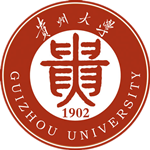School Badge

About Guizhou University
Guizhou University (GZU), founded in 1902, was first known as Guizhou Institute of Higher Learning, Provincial Guizhou University, National Guizhou College of Agriculture and Engineering, and National Guizhou University. It officially adopted the name “Guizhou University” in October 1950. Soon after, in 1951, Chairman Mao Zedong formally inscribed the name “Guizhou University.” In August 1997, it merged with Guizhou Agricultural College and some other institutions. Many years later, in August 2004, it merged with Guizhou University of Technology. In December of the same year, it became one of the higher institutions jointly established by the Ministry of Education (MOE) and the Guizhou Provincial People’s Government. A year later in September 2005, the university was recognized as one of the national “211 Project” universities. In September 2012, it was selected as one of the 14 universities in the “Midwest Universities Comprehensive Strength Promotion Project”. In April 2016, it was listed as a national-level key sponsored university in the “One Province, One School” project in the Midwest of China. Then in 2017, GZU was included in the national “Double First-Class” Initiative, which seeks to develop world-class disciplines in education. In November of the same year, the University was awarded its first “National Civilized Campus” title. A year later, in 2018, GZU became an institution of higher learning that is to be jointly developed through ministerial-provincial cooperation between the MOE and the local government. Now we come to the present year of 2022, and GZU has the honor to be re-selected for the “Double First-Class” Initiative for China’s universities. In January 2019, the university was selected as one of the trial universities to carry out reforms on “Three Comprehensive Educational Approaches” (whole-person education, whole-process education, and all-round education) under the MOE. Two years later, in January 2021, it was included in the first batch of the model universities for the nationwide CPC development in higher education institutions.The University covers an area of 309.17 hectares and has a stretch of farm land of 65.69 hectares for teaching and experiments. Its library has a collection of more than 3.78 million paper documents, including more than 3.66 million electronic copies. The University offers a wide range of courses for 12 major disciplines such as literature, history, philosophy, science, engineering, agronomy, medicine, economics, management, law, education, and art. GZU has 39 colleges, with 34,437 full-time undergraduate students and 13,507 graduate students. It is home to 4,134 faculty members, including 2,812 full-time teachers. Of these, 598 are professors and 932 are associate professors. A total of 1436 teachers hold doctoral degrees (51.07%).
GZU has one discipline selected for China’s “Double First Class” Initiative, one national-level key discipline, two discipline teams affiliated with universities through provincial-ministerial collaborations tailored to the needs of the local industries, nine national first-class disciplines, and seven regional first-class disciplines. According the latest ESI data, GZU has four disciplines among the global top 1%; Plant & Animal Science, and Chemistry ranked among the top 3‰ and 5‰ respectively worldwide; and Agricultural Science & Engineering listed the top 1% worldwide. In addition, there are 84 first-class majors under the “Double Ten Thousand Plan”, of which 52 are national-level. Currently, there are 19 first-level discipline doctoral programs, one professional doctoral degree program, 52 first-level master’s degree programs, and 24 professional master’s degree programs.
GZU boasts two academicians of the Chinese Academy of Engineering, one academician of the International Eurasian Academy of Sciences, 15 leading talents of the National Science Fund for Distinguished Young Scholars, 24 Renowned Cultural Specialists of the Publicity Department of the Central Committee of the CPC & “Four Batches of Talents” Program, one coordinator for the Discipline Appraisal Group of the State Council’s Academic Degree Appraisal Committee, 24 members for the National Advisory Committee on Higher Education under the MOE, nine “Excellent Scientific and Technological Talents in the New Century” under the MOE, 21 prominent experts in Guizhou, and 62 provincial experts in Guizhou, seven scholars included in the “Young Elite Project”, 159 talents included in the program of first-class discipline in special areas and one distinguished professor as “Xi Shan Scholar”. In addition, one faculty member has been ranked as one of the “Highly Cited Researchers” in the world for seven consecutive years, and three have been on the shortlist of Elsevier “China Highly Cited Scholars” for four consecutive years.
Laying claim to several areas of research strength, GZU currently has established a host of scientific institutes: one State Key Laboratory of Public Big Data jointly developed through ministerial-provincial collaboration, one National Key Laboratory Cultivation Base, five centers for National and Local Joint Engineering Research (engineering laboratories), one GZU International Scientific Cooperation Base, one National Overseas Expertise Introduction Center for Discipline Innovation ( the “111” Center), one University Science Park, one National Technology Transfer Agency, one National New Rural Development Research Institute, six Key Experimental Laboratories (centers) under the MOE, one Field Observation and Research Station under the MOE, one Key Laboratory under the Ministry of Land and Resources, one key area innovation team of the National Innovative Talent Promotion Program, two innovation teams affiliated with the MOE, one science and technology innovation team affiliated with the Ministry of Land and Resources, one Technological and Engineering Research Center of the National Forestry and Grassland Administration, 56 provincial key laboratories (centers), eight postdoctoral research stations, 27 national experimental teaching demonstration centers, nine provincial humanities and social science research and demonstration bases. Besides research facilities, the University boasts four national teaching teams, 11 outstanding teachers and two teaching teams credited with providing excellent demonstration classes on ideological and political theory courses (organized by the MOE), one workshop with outstanding teachers teaching ideological and political theory courses (organized by the MOE), 11 provincial teaching teams, 45 provincial outstanding teachers, 14 outstanding teachers and 14 teaching teams credited with presenting excellent ideological and political theory courses in Guizhou, and two provincial workshops with outstanding teachers of ideological and political theory courses.
Thanks to the counterpart support program, GZU has established partnership with Zhejiang University, China Agricultural University and East China Normal University. It has also signed collaborative agreements with a number of universities across the country such as Renmin University of China, Nanjing Agricultural University, Xi’an Jiaotong University, Tianjin University, Southeast University, Harbin Institute of Technology, Zhejiang A&F University, Beijing University of Posts and Telecommunications, and Jiangnan University. Noticeably, GZU has always been committed to boosting Guizhou’s development in higher education through active engagement and therefore developed a collaborative partnership with nine municipal cities (prefectures) across Guizhou.Meanwhile, it has signed agreements with more than 500 enterprises including Maotai Group, Dabeinong Group, National Astronomical Observatories, Biochemistry Co., Ltd, Guizhou Phosphate Chemical Group, Guizhou Branch of China Tobacco Corporation, Guiyang Agricultural Investment Group, and Jiangsu Fengshan Group. Additionally, GZU is keen to step up scientific and technological cooperation, implementing action plans such as “Three Areas’ Science and Technology Talents”, “Technician Plan of Science”, “Ph.D Village Leader”, “111 Ph.D Project”, and “Professors and Doctoral Scholars Helping Enterprises” across Guizhou. Furthermore, the University has invested great effort fostering collaborations between universities and regions, academia and industry, while upgrading cooperation to a new level. So far, the collaboration has covered every county in nine cities (prefectures).
GZU, committed to international exchanges and collaborative education, has established long-standing relationships for exchanges and cooperation with 195 universities or research institutions across 43 countries and regions. It has been approved to be the International Education Aid Base by the Ministry of Education (MOE), International Science & Technology Cooperation Base under the Ministry of Science and Technology, the institution offering Chinese Government Scholarship, and the institution offering Confucius Institute Scholarship. GZU has two Confucius Institutes, the first one co-founded with the University of the Gambia, and later the Presbyterian College in the United States. Furthermore, the University has been actively engaged in international associations such as the SEAMEO (Southeast Asian Ministers of Education Organization), and AUN (ASEAN University Network). Since 2008, GZU has hosted and co-organized “China-ASEAN Education Cooperation Week” together with other related activities for 14 consecutive years.







